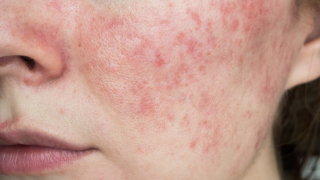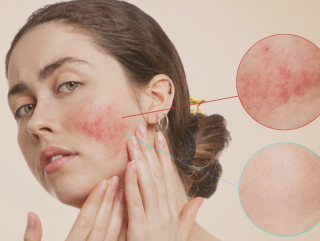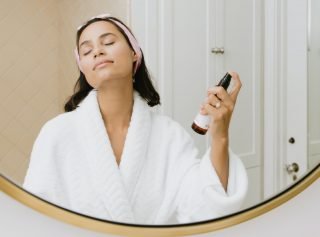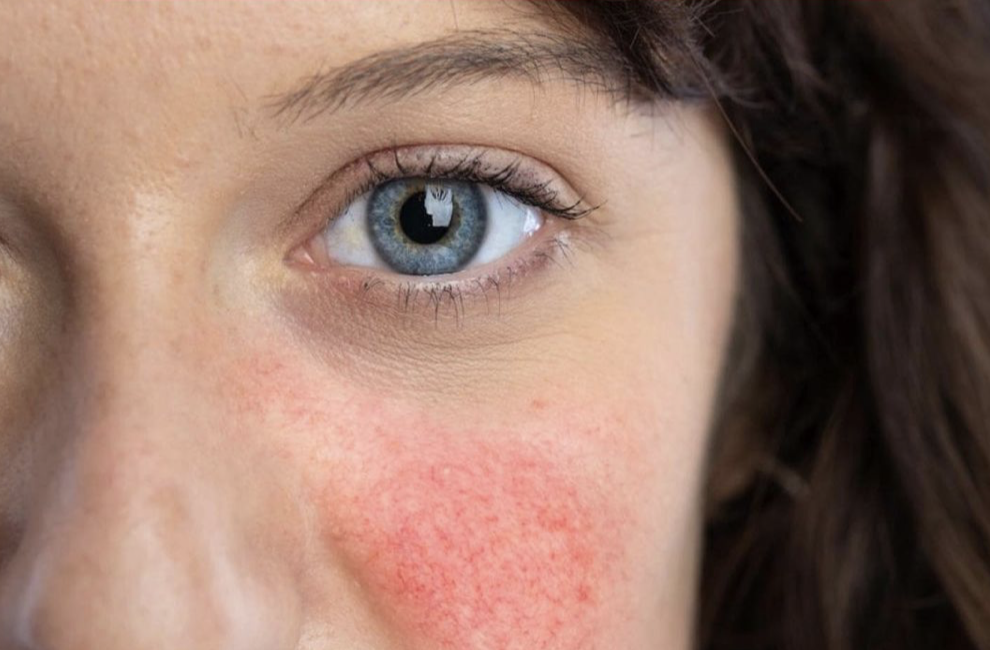As someone that struggles with rosacea, I know first hand how difficult it can be when your skin flares up for no apparent reason. You make sure that you’re consistent as far as skincare goes and use all the right products recommended for your skin. But, despite all your efforts, your skin just won’t settle. Having red, hot and irritated skin is unpleasant any way you look at it. But these flare ups can actually be painful as well as difficult to manage.
What is rosacea?
At its core, it’s a chronic skin disease that affects millions of people around the world. It is, thus far, incurable and the underlying cause is currently unknown. It can, however, be treated by a dermatologist and these treatments can help to minimize the symptoms, but unfortunately, it cannot currently be cured.

Image via Instagram @advanceddermatology
Those of us who have heard of rosacea tend to think of it as a skin disease. This is not the case at all. In fact, there are four different subtypes of rosacea. Each of these subtypes has its own individual set of signs and symptoms. It’s also worth mentioning that you can have more than one subtype of rosacea at any one time.
Subtype one is what most of us would ‘recognize’ as rosacea. It’s characterized by facial flushing and redness of the skin, as well as visible blood vessels. The second subtype is also known as acne rosacea. It’s characterized by “breakouts” which resemble those of acne and most commonly affect middle-aged women with pale skin.
Subtype three is scientifically known as “rhinophyma”, this type of rosacea is much rarer and is associated with a thickening of the skin on the nose. It most commonly affects men. The final subtype of rosacea is known as ocular rosacea, and the symptoms are centered around the eyes.
What happens during a flare-up?
Often, I notice that, apparently without reason, my pores seem more open, and my skin becomes bumpy and even sometimes raised as if it has been damaged. My makeup refuses to sit right on my skin and every single product under the sun seems to irritate it, no matter how gentle (or expensive).

Image via Instagram @advanceddermatology
Generally, as the day goes on, my cheeks flush, redden and become hot, and the entire experience is just plain uncomfortable.
Typically, dermatologists recommend keeping a ‘skin diary’ so that you can better understand triggers. Most of us (myself included) are rather lax as far as that goes. But it might not be as big a mystery as you think it is, in fact, these three triggers could be behind your skin discomfort.
These three things might be to blame
As with most things, though it might appear to have no rhyme or reason, there likely is an explanation for why your skin is flaring up and causing you the hassle. Though these aren’t the only things that could cause a flare-up, they are, according to board-certified dermatologist Estee Williams, the most likely culprits.
Surprise surprise, it might be hormones

This will likely come as no surprise at all (especially to women because we know just how powerful hormones can be). The connection between your skin and hormones is well documented.
The stress hormone cortisol breaks down collagen, whilst melatonin (released during sleep) aids in skin repair and rejuvenation. Estrogen, progesterone, and testosterone, the sex hormones, also influence the skin in a huge way.
One of the major issues with rosacea is that we really don’t know enough about it. According to Williams, however, despite a lack of in-depth knowledge, there is clearly a connection. Rosacea, though it also affects younger people, is most common in middle age.
Of course, this is a time during which your hormone balance can change drastically, especially for women as they go through menopause. Pregnant and perimenopausal women often report flare-ups, and they even seem to be common during menstruation.
Your skin microbiome
This likely isn’t going to come as a huge shock. As far as your skin goes, the microbiome forms a vital part of the skin’s function. It performs a huge array of important roles, including reducing oxidative stress and keeping skin hydrated and calm. So it stands to reason that any disturbance, however minor it may seem, in the skin’s microbiome can throw your skin out of balance and trigger a flare-up of a skin condition such as rosacea.

Photo by Kalos Skincare on Unsplash
According to Williams, Demodex mites, which we all have on our faces, play a major part. It seems that there are a lot more of these mites present on the skin of a rosacea sufferer (although more research is necessary). And though they don’t understand yet quite understand how the abundance of mites might trigger rosacea, it seems clear that this is an area worthwhile looking into.
It’s what you’re eating
Most of us try to live healthily and this, of course, includes eating healthy foods that are good for us. Despite that though, the food we eat (whether it appears healthy or not) seems to be directly associated with rosacea flareups.

This isn’t to say that any diet or food can cause rosacea because it definitely can’t. However, there do seem to be certain foods that irritate and trigger rosacea flare-ups.
The National Rosacea Society compiled a list of foods that were commonly reported as triggers by sufferers. These included some really surprising entrants such as spinach, nuts, avocados, soy, and even citrus fruits. All of which are typically regarded as healthy options.
Other foods that seemed to trigger flare-ups included alcohol (particularly red wine), coffee, tea, spicy foods, and even cakes and biscuits.
The list is so long, though, that Williams admits it is impossible to avoid everything mentioned. Instead, she recommends taking note of what triggers it for you food-wise and trying to avoid those specific items.
Referencing
https://www.mindbodygreen.com/articles/rosacea-triggers-and-causes-according-to-dermatologist
https://www.instagram.com/dresteewilliams/?hl=en
https://www.healthline.com/health/skin/rosacea#causes
https://www.mayoclinic.org/diseases-conditions/rosacea/symptoms-causes/syc-20353815





![women [longevity live]](https://longevitylive.com/wp-content/uploads/2020/01/photo-of-women-walking-down-the-street-1116984-100x100.jpg)









